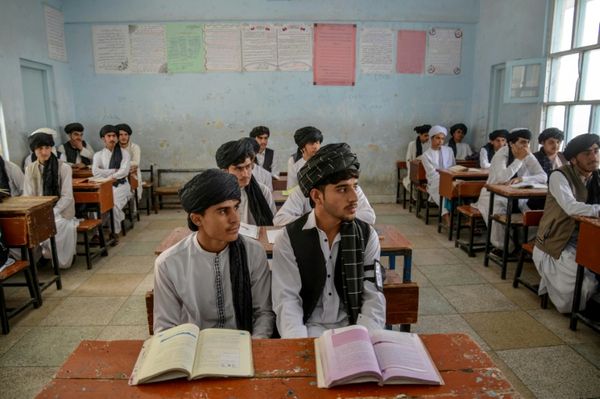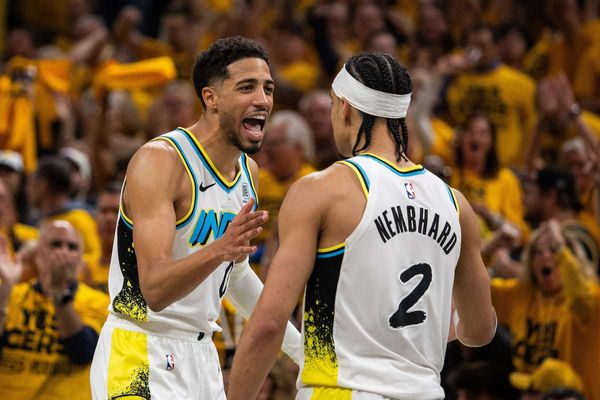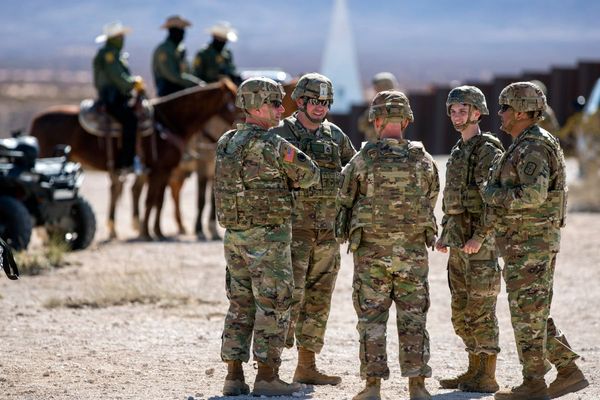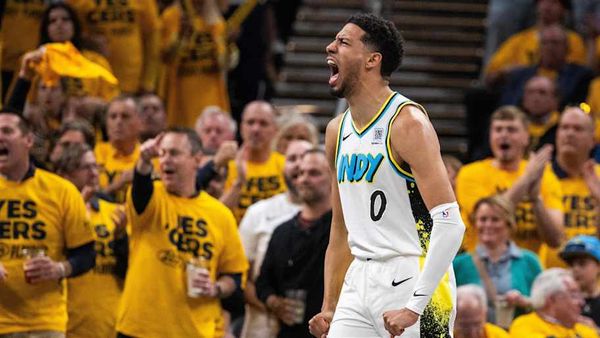
FORT LAUDERDALE, Fla. _ H. Wayne Huizenga, whose restless entrepreneurial spirit led him to become the only U.S. businessman to found three Fortune 500 companies, has died.
He was 80.
His death was confirmed by his daughter, Pamela Huizenga Alexander. The cause of death was not given.
In creating companies including Waste Management, Blockbuster and AutoNation, Huizenga earned a reputation as a corporate alchemist, spinning fractured industries into consolidated empires that dominated the marketplace in trash collection, video rentals and automotive sales.
Huizenga used his wealth and persuasiveness to bring baseball and hockey to South Florida. In the early 1990s, he owned three of South Florida's professional sports teams: the Miami Dolphins, the Florida Panthers and the Florida Marlins.
According to the Forbes 400 list of wealthy Americans, Huizenga's net worth of $2.8 billion in 2017 made him the 288th wealthiest person in America.
Huizenga also had a hand in building the sports teams' homes. His push to find the Florida Panthers a permanent place to play led to the construction of their arena, the BB&T Center in Sunrise.
After he bought the Dolphins in the early 1990s, Huizenga also purchased their home field, Joe Robbie Stadium (now known as Hard Rock Stadium) in Miami Gardens.

As he prospered in business, Huizenga, along with his wife Marti, donated generously to the community. Marti Huizenga died in January 2017 at age 74.
The Huizenga Family Foundation made $2.6 million in contributions in 2015 alone, the latest year forms were filed with the IRS.
Huizenga was a strong supporter of Nova Southeastern University in Davie. Its College of Business and Entrepreneurship bears his name.
In 1989, the Huizengas donated $1 million to the Broward Community Foundation to establish the Huizenga Foundation, a children's fund. The entrepreneur also gave $1 million in personal and corporate funds in 1997 to The African-American Library Research Library and Cultural Center in Fort Lauderdale.
The man with the hard-to-pronounce Dutch surname (HIGH-zing-a) hailed from the Chicago area, but it was in Florida _ his home for more than 60 years _ that he gained celebrity status for his entrepreneurial energy and vision.
After his success with Blockbuster Entertainment _ and later Extended Stay hotels and AutoNation _ local investors wanted his autograph as much as the opportunity to invest in his next venture.
As a businessman Huizenga was famously disciplined and demanding, determined to outwork competitors and inspire employees. He could have fun, too. AutoNation CEO Mike Jackson has spoken in published interviews about his friend's love of golf, a good joke and a 19th hole glass of Irish whiskey.
But behind Huizenga's piercing ice-blue eyes was a deal-making acumen and a drive to succeed that could not be derailed. Asked in 2002 about his next project, Huizenga told the Sun Sentinel: "Whether we'll find another Waste Management or Blockbuster, or AutoNation or Extended Stay again, I don't know. The chances of doing something like that again are probably quite slim.

"But," he said, "that doesn't mean we're not out there looking."
H. Wayne Huizenga was born Dec. 29, 1937, in the Chicago suburb of Evergreen Park to parents of Dutch descent. The H stood for Harry, but he was always called Wayne.
He attended a Christian school until his mid-teens, spent all day Sunday in church and was forbidden to read the comics by his religious parents, he said in a 1994 interview.
After his family moved to the Fort Lauderdale area when he was 15, Huizenga attended Pine Crest School, where he played center on the football team and was class treasurer. After high school graduation, he moved back to Chicago.
In 1956, Huizenga enrolled at Calvin College, a liberal arts school in Grand Rapids, Mich., affiliated with the Christian Reformed Church. He dropped out before the end of his sophomore year and moved back to Fort Lauderdale.
Peter Huizenga once explained his cousin's lack of formal higher education to the Sun Sentinel this way: "Wayne couldn't sit still long enough to get a degree."
Huizenga's road to riches began in the early 1960s when a friend asked him to manage a three-truck trash-hauling operation in Pompano Beach. While he saw the potential in a service industry with steady, repeat customers, Huizenga also remembered the words of his businessman father: "You can't make any real money working for someone else."
So in 1962 Huizenga borrowed $5,000 from his dad to buy a truck and started a garbage route of his own. Seven years later, his Southern Sanitation Service operated 20 trucks on routes in Fort Lauderdale, Miami, Tampa and Key West.
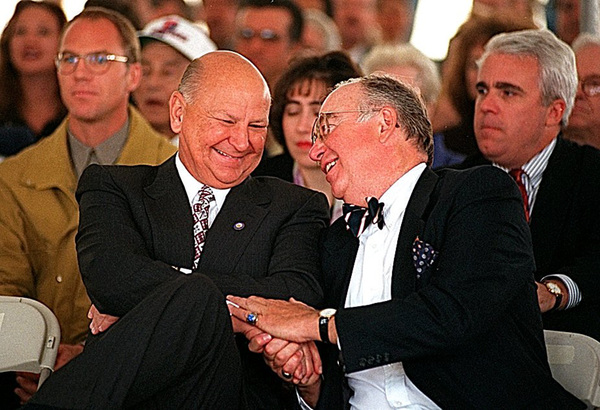
Waste Management was born from a merger of Southern Sanitation with three Chicago-based companies, including two firms that were successors to Huizenga & Sons, his grandfather's trash-hauling company. Waste Management went public in 1971.
Huizenga left Waste Management in 1984 at age 47, but his career cobbling together profitable business giants from small players was just beginning.
Blockbuster was brought to Huizenga's attention by a former Waste Management colleague who had invested in a franchise store. Although Huizenga had no interest in movies himself, he again saw the value in a one-product concept that could be copied across the nation.
With two partners, Huizenga bought 35 percent of Blockbuster for $18.5 million. The company then owned eight stores and franchised 11. As he did with Waste Management, Huizenga expanded and bought out competitors.
By 1992, there were 2,000 stores, and videotape rental company Blockbuster was No. 1 in its industry.
"I like the service business, " Huizenga said in an interview with the Sun Sentinel when he was given the newspaper's Excalibur Award for Broward Leadership in 1989. "If I sell you a TV, then I may not see you again for five years. But if I repair TVs, then I see more people. Blockbuster's the same way; it's an ongoing business."
Five years later he sold his shares in the company to Viacom for $8.4 billion.
In May 1995, Huizenga paid $27 million for an 18 percent stake in Republic Industries, an Atlanta-based garbage collector that soon became the vehicle that would carry him to his next consolidation enterprise: the car business.

Born in 1996, AutoNation was the brainchild of Huizenga and another South Florida entrepreneur, Jim Moran, who built the auto empire of JM Family Enterprises in Deerfield Beach.
Under Huizenga's direction, AutoNation became a nationwide network of new- and used-car outlets. Over one six-month period, he bought 65 auto dealerships with 109 outlets, opened 11 used-car superstores called AutoNation USA, and purchased three rental-car agencies, including Alamo and National.
AutoNation is now the largest provider of new and used cars and trucks in the U.S. with 2017 revenues of $21.5 billion. In 2015, AutoNation sold its 10 millionth vehicle, the first automotive retailer to reach that milestone.
Not everything was a smashing success. Huizenga and a partner bought Swisher Hygiene in 2004 and took it public in 2011. But the commercial cleaning business was accused of inflating its reserves while acquiring other small businesses. Huizenga left the company's board in 2013. Two executives were indicted on charges of securities fraud in 2015.
One Huizenga dream left unfulfilled was Wayne's World, the amusement park and sports complex he envisioned in southwest Broward in the early 1990s. When he sold Blockbuster to Viacom in 1994, the proposed development fell off the drawing board.
But he never stopped looking for opportunities.
In 2004, his company Boca Resorts sold the historic Boca Raton Resort & Club along with two Fort Lauderdale hotels, the Hyatt Regency Pier 66 _ resold in 2016 to an Orlando company and renamed the Pier 66 Hotel & Marina _ and the Radisson Bahia Mar (now named Bahia Mar Fort Lauderdale Beach.) He later sought properties farther north and invested in more than 1,000 acres in Port St. Lucie that were slated for residential and commercial uses.
Sports mogul

Although Joe Robbie gets credit for bringing the Dolphins to Miami in the 1960s, nobody had more to do with advancing pro sports in South Florida than Huizenga.
The second owner of the Dolphins and the stadium Robbie built, Huizenga obtained expansion franchises that became the Florida Panthers and the Florida Marlins.
Under his stewardship, the Marlins won the World Series in their fifth season (1997), and the Panthers reached the Stanley Cup Finals in their third (1995-96).
Yet, despite those successes, Huizenga was a polarizing figure with local sports fans. He spent lavishly on premium free-agent players to build the Marlins' 1997 championship team, then almost immediately sold them off in order to sell the franchise, sparking animosity and distrust of the franchise that has continued under its new ownership.
Upon ending his 19-year run as a sports owner with the sale of the Dolphins in 2009, Huizenga acknowledged in an interview with the Sun Sentinel that the Marlins fire sale was among his greatest regrets.
"We lost $34 million the year we won the World Series," Huizenga said. "If I had to do it over again, I'd say, 'OK, we'll go one more year, but I'm telling you right now, at the end of this year, I'm out of here.' That's what I would have done."
Although he was in the 1990s the undisputed king of pro sports in South Florida, as owner of three teams, Huizenga became disillusioned when he saw that the sports business didn't adhere to the same bottom-line principles that guided his other enterprises. It's much easier to satisfy stockholders than sports fans, he found.
Nonetheless, the Dolphins were his first, and perhaps his only, sporting passion.

A season-ticket holder since the team's inception in 1966, Huizenga stepped up to a suite when the Dolphins moved to Joe Robbie Stadium in 1987. Following a meeting with Robbie he became part owner in 1990, and in early 1994 he completed the purchase of the team and the stadium, totaling $168 million.
Fifteen years later he sold the team to Steve Ross for $1.1 billion.
Ross told the story about when he was negotiating to buy into the franchise during the 2007 season, which the Dolphins finished 1-15. After the Dolphins upset the Baltimore Ravens following a 0-13 start to the year, Ross received a call from Huizenga informing him: "The price just went up $40 million."
Huizenga had said his No. 1 regret was that he couldn't bring a Super Bowl title to South Florida during his stewardship. While sparing no expense in hiring big-name leaders with championship resumes, including Jimmy Johnson, Nick Saban and Bill Parcells, none came close to getting the job done.
Huizenga was most comfortable deferring to the experts in the field running his teams, but criticism found him and confounded him.
"I've never tried to pretend that that's my business," Huizenga said. "I try to hire people over there and let them run it."
Huizenga viewed his forays with the Marlins and Panthers as he did other business ventures _ as opportunities to be seized.
In 1991, he exerted his influence and checkbook to bring an expansion baseball franchise to South Florida.

Huizenga chose to name the Marlins, and subsequently the Panthers, after the state, which he thought would make them marketable from Key West to the Georgia border. It was his first miscalculation in the two sports, as the teams struggled to maintain support in their home region.
As a baseball owner, Huizenga was always out of step. He led the owners' push-back against runaway salaries, which led to a players' strike in 1994, then he spent more on free agents in one offseason than any owner in history.
Huizenga was slow to grasp the vibe of baseball, remarking that the games moved too slowly and took too long. He caught the fever during the Marlins' 1997 run to the World Series, which he called the greatest athletic event he'd ever witnessed.
That didn't prevent Huizenga from ordering the selloff of players from the championship team, which began within a few weeks after the dramatic Game 7 victory that clinched the title.
After the talent-ravaged team went 54-108 in 1998, Huizenga sold the franchise to John Henry for $150 million. In addition to losing millions, he claimed he had to sell because South Florida taxpayers would not provide public money for a new stadium to a billionaire owner.
Huizenga did get public support for an arena for the Panthers in his home county, and the facility in Sunrise opened in 1998. But he soon surmised that the business of hockey would not be profitable long-term, and by 2001 he was out of that business as well, peddling the Panthers for $101 million to a group led by Andrx founder Alan P. Cohen. Currently, the team is owned by Vinnie Voila.
The Panthers paid homage to Huizenga earlier this year.
On Jan. 19, the Panthers retired the No. 37, his lucky number and the year of his birth, in a pregame ceremony, hoisting a banner with his name and the number into the rafters. Huizenga was in attendance for the ceremony, but his health prevented him from participating.
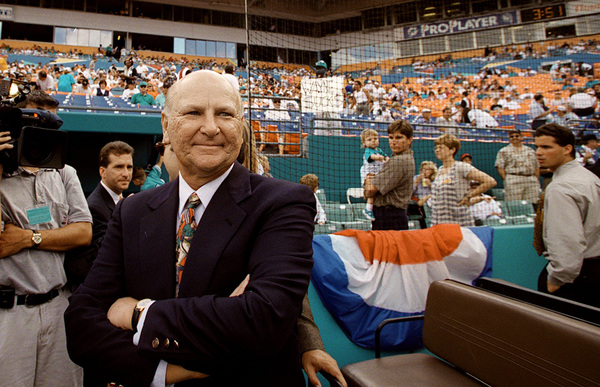
During his run as America's only owner of teams in three sports simultaneously, Huizenga confided to a Sun Sentinel reporter that he found perplexing fans' attachment to sports and their favorite teams.
"I'm not saying it's wrong. It's interesting. ... I think it's great. I just don't understand it. I don't have a problem with that. I just don't understand it, that's all."
Afterward, he reflected on his tumultuous 19-year reign over much of the South Florida sports kingdom, saying, "There were lots of great, great memories with all three teams. Of course, my passion is with the Dolphins, and I looked at the other franchises as yes, they're great to be able to bring them to South Florida and great we could make that happen."
Huizenga's name will live on in South Florida. As Huizenga was about to celebrate his 75th birthday in 2012, his friend James Blosser paid tribute with a unique gift: naming a road, Southeast Ninth Street in the Rio Vista neighborhood, "Wayne Huizenga Boulevard." Blosser, a lobbyist, covered the costs of changing the street signs.
His residence, a $16 million Mediterranean-style estate on the New River that boasts three waterfalls and a bell tower, is a favorite landmark of tour boat operators.
He's also been honored in the city's diamond-tiled Walk of Fame on State Road A1A and in 2010, when Fort Lauderdale marked its 100th anniversary, Huizenga was named "Man of the Centennial" by the Fort Lauderdale Historical Society.
He is also the namesake of Huizenga Plaza, a 1.8-acre park on the southeast corner of Las Olas Boulevard and Andrews Avenue that features a 150-seat amphitheater.
At Nova Southeastern University in Davie, a bronze bench and statue of the local icon was unveiled in 2013. The statue, in front of the Rose and Alfred Miniaci Performing Arts Center, has a plaque that reads: "We all plant seeds for shade trees under which we may never sit; however H. Wayne Huizenga planted far more than most."
Huizenga is survived his children Ray (Jennifer), Pamela (Jay), Wayne Jr. (Fonda) and Scott; and 11 grandchildren.
He is to be buried at the historic Evergreen Cemetery in Fort Lauderdale, where his structure is one of the more humble ones along the cemetery's mausoleum row.
